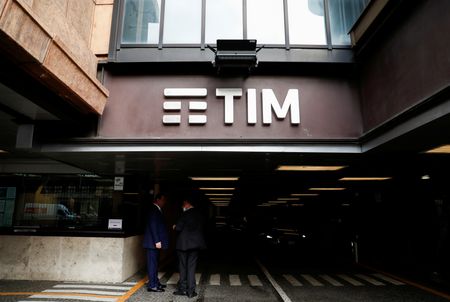By Elvira Pollina
MILAN (Reuters) – Telecom Italia (TIM) has received a non-binding bid for a controlling stake in its fixed-line network from U.S. fund KKR, and Italy’s biggest phone group said its board would meet again later this month to assess the proposal.
KKR’s move comes amid fruitless talks over the future of TIM between the government and the group’s leading investors, Vivendi and Italian state lender CDP.
After a meeting on Thursday over KKR’s approach, TIM said its board would regroup on Feb. 24 to decide over the proposal, without providing details over its terms.
A source close to the matter said the offer valued the landline “north of” 20 billion euros ($22 billion).
Moreover, the former monopoly said it remained open to any alternative may emerge in the meantime. Sources familiar with the matter told Reuters CDP still plans to promote a bid for TIM’s for TIM’s infrastructure.
Shares in TIM closed up by 9.5% after rising as much as 14% earlier.
TIM said the size of the stake sought by KKR was yet to be defined, but the move would result in the U.S. company taking control of a newly created entity comprising TIM’s domestic landline network as well as a stake in submarine cable unit Sparkle.
KKR, which is already an investor in TIM’s network, made a non-binding takeover offer for the group as a whole late in 2021 which TIM eventually rejected.
Ceding control of TIM’s prized landline network is a key plank of Chief Executive Pietro Labriola’s strategy to revamp the group and cut its 25.5 billion euro debt pile.
TIM needs to invest heavily to upgrade its ageing network, and would focus instead on developing its services business under Labriola’s plans. But progress on these proposals has hit a wall due to differences among top shareholders Vivendi and CDP.
KKR’s approach coincides with TIM looking into curbing the amount invested in switching from copper to fibre, which would potentially put KKR’s returns at risk, a source close to with the matter said.
STRATEGIC ASSET
As Italy’s biggest main telecoms infrastructure, the network is deemed strategic by the government which can block unwanted interest under so-called golden powers rules.
KKR told Italy’s right-wing administration of its intention, a senior government source told Reuters, adding that Rome stood by plans to ensure TIM’s network is managed by the state.
The industry ministry said on Thursday the government was monitoring the situation. “The government sees the safeguarding of employment levels and the security of a strategic infrastructure such as the national telecommunications network as key issues”, the ministry said in a statement.
Under Labriola’s plans to separate services and infrastructure operations, nearly a half of TIM’s 40,000 employees in Italy would follow the network as would as a significant portion of the company’s debt.
The plans have stalled as Vivendi has locked horns with state-backed CDP over the value of the network, for which Vivendi has sought a 31 billion euro valuation.
Vivendi declined to comment on KKR’s move. The French group owns 24% of TIM but it has no representatives on the board after CEO Arnaud de Puyfontaine quit his seat last month.
Vivendi has been critical of what it sees as CDP’s conflict of interest over TIM. CDP, which is TIM’s second biggest shareholder, is also the main investor in TIM’s fibre-optic rival Open Fiber and would look to combine the two companies’ infrastructure assets.
KKR, which has already invested 1.8 billion euros to buy 37.5% of TIM’s last-mile network, has been wary of CDP’s involvement because of the antitrust hurdles posed by the tie-up with Open Fiber, a person with knowledge of the matter said.
Separately, another source close to the matter said KKR’s offer left the door open to potentially involving another public entity to become a shareholder in the network.
KKR had already approached Italy’s new government at the end of last year, expressing renewed interest for TIM’s network, sources told Reuters in December. ($1 = 0.9106 euros)
(Additional reporting by Giuseppe Fonte in Rome; writing by Valentina Za; editing by Jason Neely, Keith Weir and Jane Merriman)

